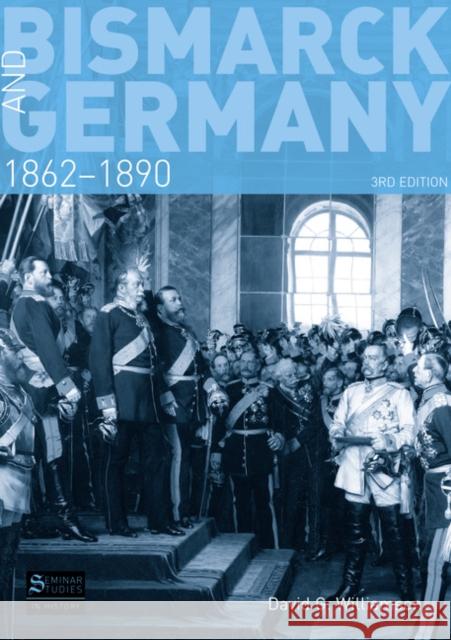Bismarck and Germany, 1862-1890 » książka



Bismarck and Germany, 1862-1890
ISBN-13: 9781408223185 / Angielski / Miękka / 2010 / 216 str.
Bismarck and Germany, 1862-1890
ISBN-13: 9781408223185 / Angielski / Miękka / 2010 / 216 str.
(netto: 186,53 VAT: 5%)
Najniższa cena z 30 dni: 176,25
ok. 16-18 dni roboczych.
Darmowa dostawa!
Bismarck s role in the unification and consolidation of Germany is central to any understanding of Germany's development as a nation and its consequent role as aggressor in two world wars. This study provides students with a concise, up-to-date and analytical account of Bismarck's role in modern German history. Williamson guides readers through the complex events leading to the defeats of Austria and France in 1866 and 1870 and the subsequent creation of a united Germany in January 1871. He then explores the domestic and foreign problems Bismarck faced up to 1890 in consolidating unification."
Glosariusz/słownik
Wydanie ilustrowane
<P>Acknowledgements</P><P>Chronology</P><P>Who’s who</P><P>Glossary</P><P>Maps</P><P> </P><P>PART ONE: THE SETTING</P><P> </P><P>1 The Background, 1815- 1862</P><P>The German Confederation</P><P>The Zollverein</P><P>The Growth of German Nationalism</P><P>The Growth of Liberalism</P><P>Conservative Acceptance of Nationalism</P><P>Catholicism and Nationalism</P><P>The 1848 Revolutions</P><P>The Radowitz Initiative and the Revival of the Confederation</P><P>Austro-Prussian Relations, 1853-1859 </P><P>The Constitutional Conflict in Prussia</P><B></B><P>Bismarck</P><P>Bismarck’s Appointment as Prussian Minister-President</P><P> </P><P> </P><P>PART TWO DESCRIPTIVE ANALYSIS</P><P></P><P>2 The Constitutional Conflict </P><P></P><P>Confrontation with the Liberals</P><P>The Liberals Divided </P><P></P><P>3 The German Question, 1860-66</P><P> </P><P> </P><P>Public Opinion and German Unity: The Nationalverein and Reformverein<B> </P><P></B>Austro-Prussian rivalry and the reform of the Confederation, 1860-62</P><P>Bismack and Austria, 1862-3</P><P>The Schleswig Holstein Crisis, 1863-4</P><P>The Options facing Bismarck</P><P>From Schönbrunn to Bad Gastein</P><P>Austria’s ‘Economic Königgratz’</P><P>On the Brink of War</P><P>The Austro-Prussian War</P><P>The Home Front </P><B><P>PART THREE: THE NORTH GERMAN CONFEDERATION </P></B><P>4.<I> </I>THE CREATION OF THE NORTH GERMAN CONFEDERATION, 1866–67 </P><P>The Prussian Indemnity Bill </P><P>The Spoils of War </P><P>The Constitution of the North German Confederation </P><P>5. BISMARCK, NAPOLEON AND THE SOUTHERN STATES </P><P>The Luxemburg Crisis </P><P>The Southern States and German Integration </P><P>6. THE FRANCO-PRUSSIAN WAR AND THE UNIFICATION OF</P><P>GERMANY, 1870–71 </P><P>The Hohenzollern Candidature </P><P>The Outbreak of War </P><P>The unification of <I>Kleindeutschland</P></I><P>The Armistice and the Treaty of Frankfurt </P><B><P>PART FOUR: THE ECONOMIC AND CONSTITUTIONAL</P><P>CONTEXT, 1871–90 </P></B><P>7. THE SECOND <I>REICH</I>: A HYBRID STATE </P><P>The Administrative and Legislative Infrastructure </P><P>The Problem of Prussia</P><P>8. ECONOMIC DEVELOPMENTS, 1871-90 </P><P>The impact on the Economy of the ‘Great Depression’ </P><P>Structural Changes in the German Economy</P><P>The Political Consequences of the ‘Great Depression’ </P><P><B>PART FIVE: DOMESTIC POLITICS </P></B><P>9. THE <I>KULTURKAMPF </I>AND THE DECLINE OF THE NATIONAL LIBERALS </P><P>A Bismarck-Liberal Axis?</P><P>The <I>Kulturkampf </P></I><P>Protectionism and the End of the Liberal Era </P><P>The Tariff Act of 1879 </P><P>10. THE CONSERVATIVE EMPIRE </P><P>The Second Foundation of the <I>Reich </P></I><P>Bismarck’s Loss of Control over the <I>Reichstag </P></I><P>Bismarck and the SPD</P><P>Bismarck’s Social Welfare Programme</P><P>Jews and Poles and the Policy of Germanisation </P><P>The Formation of the <I>Kartell </I>and a Brief Period of Stabilization<I> </P></I><P>Bismarck’s Fall </P><P><B>PART SIX: GERMAN FOREIGN AND COLONIAL POLICY </P></B><P>11. GERMANY AND EUROPE, 1871–90 </P><P>The League of the Three Emperors </P><P>The Eastern Crisis, 1875–78 </P><P>The Dual Alliance and Three Emperors’ Alliance </P><P>The Franco-German Entente </P><P>The Bulgarian Crisis and its Consequences </P><P>12. THE CREATION OF THE GERMAN COLONIAL EMPIRE </P><P>Bismarck’s Motives </P><P>The Annexations in Africa and the Far East </P><P>Bismarck’s Disillusion with the Colonies </P><P><B>PART SEVEN: ASSESSMENT </P></B><P>13. BISMARCK IN MYTH AND REALITY </P><P>Bismarck in Retirement </P><P>His Achievements </P><P>Bismarck and the Historians </P><P>Conclusion </P><P><B>PART EIGHT: DOCUMENTS </P></B><P>1 Arminius Riemann’s speech at the Wartburg Festival in 1817</P><P>2 The Historian A.J.P. Taylor on the 1848 Revolutions</P><P>3 The Economy and National Unity</P><P>4 The <I>Nationalverein</I> Programme, 1859</P><P>5 The Prussian Liberals Long for a German Cavour, 1861</P><P>6 King William and the Army Bill</P><P>7 Bismarck Foresees war with Austria</P><P>8 Bismarck and the German Confederation</P><P>9 Blood and Iron</P><P>10 Bismarck and Commercial Reform, 1865</P><P>11 The Internal Impact of D<B>ü</B>ppel</P><P>12 Liberal opposition to the War of 1866</P><P>13 Bismarck and Schleswig-Holstein</P><P>14 Bismarck Defends the Austria Alliance, February 1865</P><P>15 Financing mobilization, July 1865</P><P>16 The Gastein Convention, 14 August, 1865</P><P>17 Bismarck’s Peace Policy, July 1866</P><P>18 Russian and British views on Prussia’s victory, 1866</P><P>19The National Liberals and the North German Confederation</P><P>20 Bismarck on War, March 1867</P><P>21 Bismarck and German Unity in 1869</P><P>22 The Ems Telegram </P><P>23 French Partisans, December 1870</P><P>24 Military Impatience with Bismarck, December 1870</P><P>25 Alsace-Lorraine</P><P>26 Bismarck’s Power</P><P>27 Speculation Mania</P><P>28 The Industrialization of Germany</P><P>29 The Flight from the Land</P><P>30 Grain Prices</P><P>31 The Foundation of the Association for Reform of Taxation and Economy </P><P>32 Grassroots Support for Protection</P><P>33 Condition of the Urban Working Class in Germany, 1893</P><P>34 Reichstag Elections, 1871-1890</P><P>35 Annual Earnings of workers in Industries, Commerce and Transport, 1871-1913</P><P>36 Bismarck Attacks the Catholic Clergy</P><P>37 Bismarck’s Guiding Principle in Domestic Policy</P><P>38 A Liberal Academic Asseses Bismarck</P><P>39 Extracts from the Ant-Socialist Law, 1878</P><P>40 German Grain Tariffs</P><P>41 Rumours of a coup</P><P>42 The Conservative Bias of the Prussian Civil Service </P><P>43 Disagreement between WilliamII and Bismarck, January 1890</P><P>44 Bismarck declares Germany a satiated Power</P><P>45 Bismarck Defends the Dual Alliance</P><P>46 Separate Protocol to the Three Emperors’ Alliance, 18 June 1881</P><P>47 Atmosphere at St Petersburg, Autumn, 1886</P><P>48 Angra Pequena</P><P>49 German Historians as History</P><P>50 Hans-Ulrich Wehler’s interpretation of Bismarck’s Politics after 1871</P><P> </P><P> </P><P> </P><P>Guide to Further Reading</P><P>References</P><P>Index</P><P> </P>
David G. Williamson has written extensively on modern German history and international relations. Among his publications are Poland Betrayed: The Nazi Societ Invasions of 1939 (2009) and The Third Reich (4th edition 2010). Formerly head of History at Highgate School, he is now a writer and freelance lecturer
1997-2026 DolnySlask.com Agencja Internetowa
KrainaKsiazek.PL - Księgarnia Internetowa









